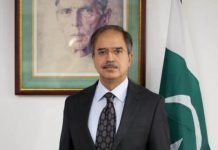The minister said the impacts of climate change had compelled policymakers worldwide to rethink how societies build, plan and live
Saifullah Ansar
ISLAMABAD, Minister for Planning, Development and Special Initiatives Professor Ahsan Iqbal on Thursday said Pakistan had transitioned from a reactive climate response to a proactive climate-smart planning framework, aimed at tackling the pressing environmental and developmental challenges confronting the country.
“Our government’s commitment is clear. We have moved from reactive climate response to proactive climate smart planning,” he said while addressing an event here.
The minister said the impacts of climate change had compelled policymakers worldwide to rethink how societies build, plan and live. “Every flood, every heat-wave and every urban shock reminds us that the durability of our growth depends on the sustainability of our foundations,” he remarked.
Ahsan Iqbal said Pakistan, being among the most climate-vulnerable countries, could no longer afford to rely on reactive measures. “In 2022, catastrophic floods caused losses of over $30 billion, and again in 2025, major flooding inflicted widespread destruction. However, our preparedness and lessons learned from 2022 helped us avert much larger losses this time,” he added.
He stressed that climate change was no longer a future concern but a present reality that demanded institutional and policy action on permanent foundations. “Unfortunately, we are champions of more talk and less action. Now we must reverse this – less talk, more action,” he added.
The minister said that political instability had remained the biggest hurdle in implementing long-term policies, adding “No country in the world has prospered amidst uncertainty and disorder. If we want Pakistan to progress, we must ensure stability in our policies and governance.”
Referring to the economic recovery, Ahsan Iqbal said Pakistan had narrowly avoided internal default in April 2022, when the Finance Division was unable to issue a monthly budget due to depleted reserves.
He lauded the leadership of Prime Minister Shehbaz Sharif for taking difficult decisions that stabilized the economy. “Despite painful adjustments, the people endured because they knew the hardship was not of their making but necessary for national recovery,” he maintained.
He pointed out that international financial institutions had recognized Pakistan’s turnaround. “Fitch, Moody’s, and Standard & Poor’s – none of which are government entities – have upgraded Pakistan’s ratings. Inflation has dropped from over 38 percent to 4.5 percent, the policy rate has reduced from 23 percent to 11 percent, and the stock market has nearly doubled,” he highlighted.
“Pakistan is now ready to take flight, but this time we must ensure that the flight is sustainable and not crash again,” the minister emphasized, adding that the country’s youth deserved a stable and prosperous future based on consistent economic policies.
He said sustainable growth now hinged on integrating climate-smart practices into development. “Future productivity will depend on whether production cycles are green, net-zero and carbon-efficient. Green buildings do not mean painting structures green; it means adopting designs that reduce emissions, maximize natural light and conserve energy and water,” he explained.

















